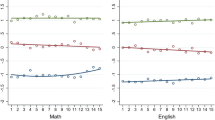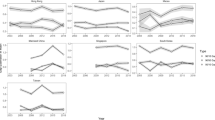Abstract
Considering that achievement gaps have become a serious educational problem worldwide, the Ministry of Education in Taiwan has been addressing a series of policies to reduce achievement gaps, but the effect of these policies has not yet been carefully examined. Therefore, the present study investigated current educational policies, achievement gap phenomenon, and its changing trends in the use of national standardized tests in Taiwan and evaluated the degree to which these policies are reducing the achievement gaps among Taiwanese students. Junior high school graduates who took the high school entrance examination between 2004 and 2010 were recruited to examine the associations between their academic achievements and variables such as socioeconomic status (SES), ethnicity, and school district. Time series analyses were conducted to determine the longitudinal trends for the achievement gaps. The results revealed that achievement gaps are decreasing among different ethnicities, but they are increasing among different SESs and school districts. These findings demonstrate some positive effects of the educational policies introduced in Taiwan, but also the need for further modification and precise implementation of these policies. Suggestions for implementing educational programs and policies to reduce achievement gaps are also presented.




Similar content being viewed by others
References
Bénabou, R., Krammarz, F., & Prost, C. (2009). The French Zone d’Education Prioritaire: Much ado about nothing? Economics of Education Review, 28(3), 345–356.
Bodine, E., Fuller, B., Gonzalez, M., Huerta, L., Naughton, S., Park, S., et al. (2008). Disparities in charter school resources-the influence of state policy and community. Journal of Education Policy, 23(1), 1–33.
Brown, K. M., Benkovitz, J., Muttillo, A. J., & Urban, T. (2011). Leading schools of excellence and equity: Documenting effective strategies in closing achievement gaps. Teachers College Record, 113, 57–96.
Buhlmahn, E. (2003). Rede der Bundesministerin für Bildung und Forschung. In Bundesministerium für Bildung und Forschung (Eds.), Zukunft Bildung und Betreuung (pp. 13–18). Berlin: BMBF.
Chiu, H. N. (2010). The educational priority areas project: A case study in the United Kingdom and Taiwan. E-Society Journal, 87, A5. Retrieved May 15, 2010 from http://www.nhu.edu.tw/~society/e-j/87/A5.htm.
Chou, H. F. (2008). Social class effect on children’ academic achievement: Using family resources as analytic frame. Taiwan Journal of Sociology of Education, 8, 1–43.
Cohen, G. L., Garcia, J., Purdie-Vaughns, V., Apfel, N., & Brzustoski, P. (2009). Recursive processes in self-affirmation: Intervening to close the minority achievement gap. Science, 324, 400–403.
Department for Education. (2010). The importance of teaching: The schools white paper 2010. UK: The Stationery Office.
Diebold, F. X. (2004). Elements of forecasting (3rd ed.). Cincinnati, OH: Thomson/South-Western.
Feuer, M. J., Towne, L., & Shavelson, R. J. (2002). Scientific culture and educational research. Educational Researcher, 31, 4–13.
Gregory, A., Skiba, R. J., & Noguera, P. A. (2010). The achievement gap and the discipline gap: Two sides of the same coin? Educational Researcher, 39(1), 59–68.
Hargreaves, D. H. (2000). Teaching as a research-based profession: Possibilities and prospects. In B. Moon, J. Butcher, & E. Bird (Eds.), Leading professional development in education. London: Routledge-Falmer.
Haycock, K. (2001). Helping all students achieve: Closing the achievement gap. Educational leadership, 58(6), 6–11.
Ho, M. Y. (2001). A study of junior high school students’ family structure academic performance and delinquent behaviours. Unpublished master’s thesis, National Kaohsiung Normal University, Kaohsiung, Taiwan.
Hou, C. W., et al. (2008). Effectiveness of after-school academic support program implementation: A report from the local administrative officers. Paper presented at the annual conference of Taiwan Association for Sociology of Education, Chiayi, Taiwan.
Ko, S. H. (2004). A comparative study on academic achievements for immigrant brides, children at an elementary school in Keelung. Unpublished master’s thesis, National Taipei University of Education, Taipei, Taiwan.
Ladson-Billings, G. (2006). From the achievement gap to the education debt: Understanding achievement in U.S. schools. Educational Researcher, 35(7), 3–12.
Lavonen, J. (2007). Education policy and its implementation through science teacher education and science curriculum in Finland. Paper presented at the Finish-Taiwan workshop, Department of Applied Sciences of Education, University of Helsinki, Finland September 30–31, 2007.
Lee, J. (2002). Racial and ethnic achievement gap trends: Reversing the progress toward equity? Educational Researcher, 31(1), 3–12.
Lee, J. C. (2006). Research of Chinese learning achievements of the first-grade students with Southeast Asian mothers—Case of Jhubei and Jhudong. Unpublished master’s thesis, Chung Hua University, Hsinchu, Taiwan.
Lee, H. Y. (2008). A study on the effects of education welfare action zone policy in Korea. Educational Research for Policy and Practice, 7, 35–45.
Leithwood, K. (2010). How the leading student achievement project improves student learning: An evolving theory of action. Retrieved from: http://www.scribd.com/doc/55363396/Leading-Student-Improvement-Project.
Leithwood, K. (2011). Characteristics of school districts that are exceptionally effective in closing the achievement gap. Leadership and Policy in Schools, 9, 245–291.
Lin, C. S. (2003). Differences in the related factors of learning behaviour and academic achievement between aboriginals and Hans students. Unpublished master’s thesis, National PingTung University of Education, PingTung, Taiwan.
Miyake, A., Kost-Smith, L. E., Finkelstein, N. D., Pollock, S. J., Cohen, G. L., & Ito, T. A. (2010). Reducing the gender achievement gap in college science: A classroom study of values affirmation. Science, 330, 1234–1237.
Pressley, M., Duke, N. K., & Boling, E. C. (2004). The educational science and scientifically based instruction we need: Lessons from reading research and policymaking. Harvard Educational Review, 74, 30–61.
Reardon, S., & Galindo, C. (2009). The Hispanic-white achievement gap in math and reading in the elementary grades. American Educational Research Journal, 46(3), 853–891.
Rijkschroeff, R., Dam, G., Duyvendak, J. W., Gruijter, M., & Pels, T. (2005). Educational policies on migrants and minorities in the Netherlands: Success or failure? Journal of Education Policy, 20(4), 417–435.
Tikly, L., Osler, A., & Hill, J. (2005). The ethnic minority achievement grant: A critical analysis. Journal of Education Policy, 20(3), 283–312.
Tsai, J. S. (2000). The idea and direction of implementation of educational priority area. Newsletter for Teaching the Humanities and Social Sciences, 10(5), 160–170.
Verwaltungsvereinbarung. (2003). Investitionsprogramm Zukunft Bildung und Betreuung 2003–2007. Berlin: BMBF.
Wagner, T. (2010). The global achievement gap: Why even our best schools don’t teach the new survival skills our children need and what we can do about it. New York: Basic Book.
Wang, C. S., & Tsai, C. C. (2008). A study of learning adaptation and academic achievements of Taiwan’s elementary school students: Mothers with Southeast Asian, Mainland-Chinese, and Taiwanese nationality. Educational Policy Forum, 11(2), 75–105.
Wu, C. S., & Tsai, C. C. (2006). A comparative analysis of educational accountability in the UK and USA. Journal of National Taiwan Normal University, 51(1), 1–21.
Acknowledgments
Parts of this research were supported by the funds from the Aim for the Top University Project (Ministry of Education, Taiwan) and National Science Council (102-2911-I-003-301; 102-2511-S-003-001-MY3; 101-2511-S-003-058-MY3).
Author information
Authors and Affiliations
Corresponding author
Rights and permissions
About this article
Cite this article
Sung, YT., Tseng, FL., Kuo, NP. et al. Evaluating the effects of programs for reducing achievement gaps: a case study in Taiwan. Asia Pacific Educ. Rev. 15, 99–113 (2014). https://doi.org/10.1007/s12564-013-9304-7
Received:
Revised:
Accepted:
Published:
Issue Date:
DOI: https://doi.org/10.1007/s12564-013-9304-7




